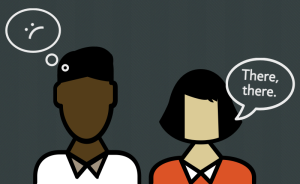If you’re like me, despite your best efforts, you sometimes hear yourself saying things in social settings that sound downright pre-recorded – from, like, the middle of the last century.
Maybe you smile, shrink, and say “I’m sorry” when a guy just got in your way. Or you say “Oh, it’s okay,” after someone asks if a comment was offensive, and actually, it was.
And you wonder, What was that? Why can’t I rewind and undo it?
This is the power of socialization, my friends.
It’s not your personal failure – it’s your social upbringing. And while there’s no rewind button, it is possible to name and become aware of our sexist (racist, ableist, otherwise oppressive) pre-sets and choose how we interact more consciously next time.
Take fempathizing, for example.
Fempathizing is that thing we do to try to make a guy feel like he’s really doing just great when he’s actually teetering on the edge of the asshole pool. It’s also the overly cheerful soothing of some random insecurity a guy felt entitled to hand us.
There are so many variations. And truly, most of the time, a calm, steady (if slightly impatient) gaze would do. (I have one friend who calls this practice, at work, ball-cupping. She says, “Until the ball-cupping is done, no real work gets done.” But okay, ew. The image. Not that balls equate manhood, either. I’m already sorry I said it. Back to fempathizing.)
So, why should we care about these little slip-ups, this micro-placating? Because Oppression-Big is made up of lots of moments of oppression-small.
The small and subtle ways that sexism creeps into communication, both verbal and non-verbal, paves the way for bigger sexism – even sexist public policies – to seem normal.
Not to mention, change starts at home – which is what Everyday Feminism is all about. Noticing and amending our own sexist socialization can improve life immediately.
So here are some ways to work with your awareness and behavior when it comes to these particular forms of “gendered” behavior.
1. Realize That This Isn’t an Interpersonal Problem (Even If It Often Plays Out Between Individuals)
Patterns in gendered socialization are not just about how men and women choose to talk to one another. There’s something bigger going on. (Besides, how could this be a uniquely man-woman phenomenon, when “man” and “woman” aren’t even stable categories – or the only ones?)
We’re talking about gender socialization here, which applies to how we establish the “performances” of masculinity and femininity.
So yes, it makes sense to gender these terms, even though the people doing the performances can vary. But by acting like the experiences of, say, mansplaining and fempathizing are simply matters of personal choice, it becomes harder to stay calm and kind as you confront social injustice.
If you have or identify with a feminine upbringing or have ever been exposed to media, the tendency to look after men (or even masculinity) can feel hard-wired.
Just like how, for men, the tendency to leap in with an explanation can feel hard-wired.
But fear not! We have the tools to reroute the circuitry.
2. Recognize How Gendered Behavior Is Interrelated (And How We Can Use That Fact to Create Change)
Are mansplaining and fempathizing always related? No. But sometimes they are. Because the more we fempathize, the more it seems that mansplaining is welcome.
That’s the thing about socialization: We’re interlocking parts.
Just so we all have a working definition, mansplaining is when a man holds forth on a topic about which the woman he’s speaking with has greater knowledge. Or maybe in a way that derails the other thing she was saying.
For some (read: people who don’t experience it; read: men), it’s harder to see how widespread this is. But it rarely happens the other way around – that women “womansplain” – because women are socialized to hold back around (perceived) authority.
But here’s the good news about how personal change influences positive social change: The less fempathizing we do, the less often men feel invited to request sympathy or be verbally taken care of by women.
They learn that it doesn’t always work.
And specifically, they learn that no one will fempathize when they say, at the end of a mansplain, “Oh, gosh, did I just monopolize the conversation? I hope my input was useful. Did I say too much?”
No need to fempathize with the speaker’s social awkwardness there. Just let him learn from it. No need to collude with the speaker’s poor behavior. Either move on with the conversation, or say, “Yes, actually, that was a bit much. Thanks for noticing.” And then get on with it.
The key is: Get on with it – without apologizing or taking responsibility for someone else’s ineptitude.
3. Discern the Difference Between Subconscious Fempathizing and Actively Choosing to Offer Support
Of course you can still offer clarity and explanation and comfort to others (regardless of gender) when you consciously choose to.
Choice is the key here.
Both mansplaining and fempthizing are subconscious behaviors we’ve inherited via socialization. And we often perpetuate them because they work for us in some way. Men receive comfort and a sense of importance and everyone else gets to not be hated or called bitches.
Hang on, that’s really messed up.
Fempathizing is the perfect term because it references both pathology and sympathy.
Sometimes it makes sense to extend yourself to bolster others – because their existence, their lives and diversity and struggles, make you stronger.
I don’t resent soothing someone when soothing is due, nor do I begrudge the particular type of understanding I have long offered gendered folks of all types.
But fempathizing, specifically, is like yodeling into a void. It’s pathological exactly because it robs everyone of valuable time, and there’s no returned sense of solidarity or understanding.
I’m a fan of social finesse. It’s the knee-jerk reaction to the man-needs-comfort scenario that troubles me.
When I hear myself fempathizing, I suddenly need a support group!
4. Focus on Helping Each Other and Being a Good Bystander
Not only can we listen and commiserate with one another about the challenges of doing subconscious socialized behavior, we can also speak up for one another in real time, when the behavior is occurring.
One doesn’t have to be doing an irritating thing in order to help stop an irritating thing. We can do this kindly. Compassionately. Patiently.
In fact, bystanders are often in a better position to help those caught up in negative aspects of socialization. You can be more kind and attentive exactly because you’re not the one engaged in the drama at that moment.
And why are kindness, compassion, and patience so important?
I’m not suggesting anger at sexism isn’t justified. It just isn’t usually helpful in interpersonal interactions where people truly want to maintain (or build) good long-term relationships.
Remember, we’re talking about interrupting socialized patterns of communication – and that’s emotionally risky business for everyone. And still, absolutely vital to disrupt.
Humor is good, when it feels appropriate. Because let’s face it, gendered interactions are often funny when we point them out. Just naming the issue can be super helpful, too.
Perhaps most importantly, assume everyone’s best intentions.
For instance, how about this response when you see someone begin fempathizing?
“Ohmygod, Elliott, it almost sounds like you want Maria to make you feel better about your earlier comments about immigrants. I’m sure that’s not it, though, because wow, your discomfort about what you said is such a positive thing. Good for you for staying with those uncomfortable feelings. Maria has such great thinking about these topics. Maybe she’d even help you figure out what to do next.”
See what I did there?
I pointed out the good things in Elliott’s (potential) behavior. I spoke to his best self. I also reframed Maria as a colleague in solving the problem, thereby reminding her that she’s a competent ally. (Although note that I didn’t assume she’d want to help Elliott. Maybe she’s busy.)
There’s no shame in her fempathizing; she can just take another role. Chances are, they’ll shift the tone and content of their conversation without feeling badly. They are now focused on solutions.
And how do you, magic bystander, do such a thing? You practice.
In real life, and also in your head, because similar conversations come up again and again. It’s not like you have pre-rehearsed answers, but you can definitely have pre-rehearsed thinking about these themes.
That’s exactly what socialization gives us: pre-rehearsed thinking. You’re just changing the content. People won’t always live up to their best selves, but it’s amazing how often they do when you behave as if they will.
5. Recognize That Ending Fempathizing Won’t Be Easy – And Can Sometimes Cause Trouble
Yes, there can be negative consequences to expecting clearer, kinder communication. You are exposing the invisible lines through which power runs, after all. And that’s uncomfortable.
The person with more power usually goes through a process of surprise or shock, then remorse and possibly fear.
Here’s how that works: Most of us like to think of ourselves as nice, good people. And it’s surprising to realize that you’ve said or done something that offends someone. The mansplainer usually doesn’t want to be an asshole. So it’s shocking for the behavior to be pointed out. So this might be followed by either remorse or disbelief.
In either case, the mansplainer is likely to want the person who’s pointed this out (possibly a woman) to fempathize and let him know it’s all okay.
And then when that doesn’t happen, he may get angry. Something isn’t going as expected. Anger may also come from the realization that a change in power dynamics will mean less privilege for him (and most of us already don’t feel privileged enough – for a whole variety of reasons). That realization is more complex though, and doesn’t usually happen in the moment.
There are plenty of times and locations in which I’ve been seen as a bitch, or as an angry feminist (even when I maintain a calm, friendly demeanor). There are even whole groups of people who consider these labels to be intractable – part of my very identity. But you know what? They also know me as competent and fair. They know me as a good communicator.
Over time, they know me as a yoga-enthusiast, a chocolate-lover, and a fan of hot springs. They know me as tenacious and talented and sometimes a little timid.
The most powerful way to disrupt stereotypes is to complicate them. The more earnest complexity you show, the less dismissible you become. The more likely people are to consider your views and opinions – even about difficult topics like mansplaining and fempathizing.
***
So, go forth and do what you can to disrupt negative gendered interactions.
The good news is that this is exactly how we rewire the social circuitry: We behave differently and invite others to come along.
There is no part of human culture that wasn’t created by humans, so we definitely have the power to change how things work. Whether it’s mansplaining or fempathizing or any other negative pre-programmed behavior: Name it. Notice it. And then cut that shit out.
Thanks Beth Townsend-Smith, for first using the term “fempathizing” in my Facebook feed, when I described the behavior.
[do_widget id=’text-101′]
Kimberly Dark helps people understand the body in culture and how we can interrupt the everyday contours of privilege and oppression in social life. She’s an award-winning storyteller, writer, and professor and leads retreats on yoga and body-stories. Read more at her website.
Search our 3000+ articles!
Read our articles about:
Our online racial justice training
Used by hundreds of universities, non-profits, and businesses.
Click to learn more





















